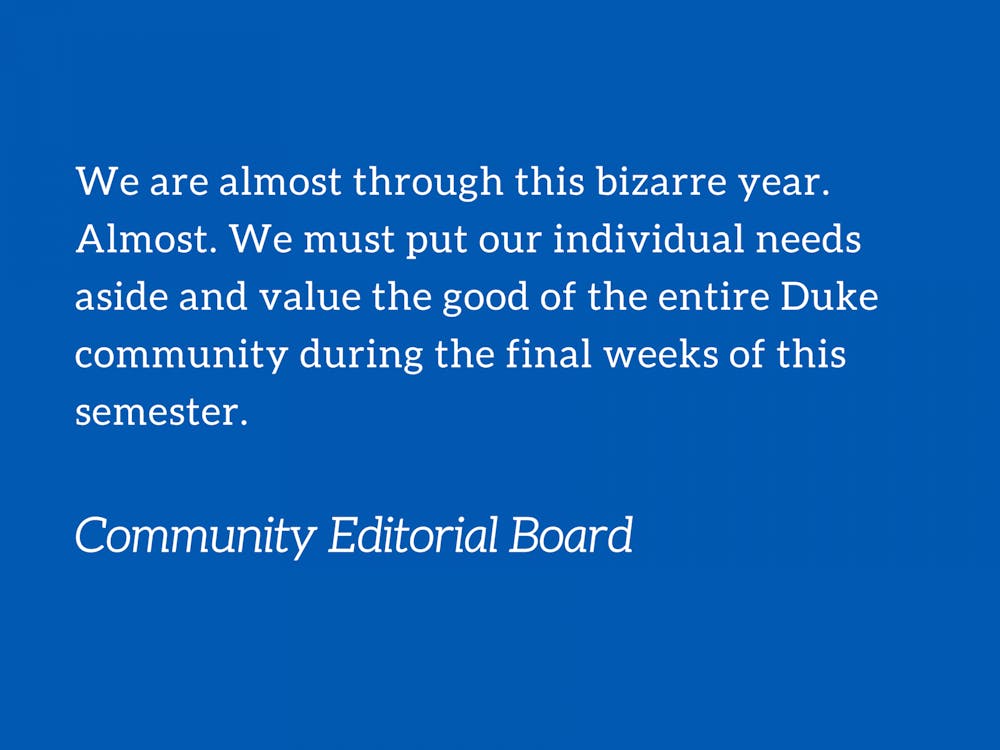Twenty-two: the number of weeks that Duke has successfully remained open during a pandemic. Since August, Duke has maintained semi-normal, albeit restricted, on-campus learning. The past twenty-two weeks have not been without flaw, but until this point, we have avoided reaching the threshold of COVID-19 cases which pushed the administration to issue a stay-in-place order. Although many students thought the Duke difference would save us, last week we endured the same lockdown routine that some peer schools experienced earlier this year.
According to Duke’s administration, we have to thank members of the disaffiliated fraternities that held in-person rush events for the surge in cases that caused our isolated week of lockdown. That these events were hosted and attended is not surprising. When the Class of 2024 partied openly on East Campus in the fall, most people wrote it off as the reckless behavior of clueless and socially starved first years. Six months later, that same behavior has forced us into our current situation where it seems everyone knows someone who either has COVID-19 or is under precautionary quarantine. Between March 8 and March 14, there were 246 active positive student cases, nearly four times the amount of the week prior. Even though we have reduced our case count and the stay-in-place order has been lifted, we are not in the clear yet.
In November 2020, in an attempt to diminish the influence of selective groups on campus life, Duke released a Next Gen 2.0 plan which delayed rush for the Class of 2024 to their sophomore fall and moved all Greek life and SLGs to the edge of campus in Edens Quad. In response, a significant majority of Duke’s Interfraternity Council fraternities disaffiliated from the University. Those fraternities now report to the student-led Durham Interfraternity Council, and over the last few weeks the Durham IFC conducted rush for the Class of 2024.
Unlike their Greek counterparts, many pre-professional organizations have successfully conducted their rush processes entirely over Zoom. Although their selection processes are not without issues, these organizations made a conscientious effort to comply with the Duke Compact. So why did members of fraternities flagrantly violate Duke’s rules, clearly not caring about the danger their unmasked rush parties posed to the larger community? And why did they find it necessary to break coronavirus-response guidelines by holding these events in the first place? Perhaps it is the sense of invincibility or even entitlement that the guilty parties seemingly possess.
The Duke administration has been engaged in a cat and mouse game with IFC fraternities for years. Before their members shut down in-person undergraduate classes, spread COVID-19 across Duke and Durham and forced students to isolate in their dorm rooms, Greek life organizations contributed to the culture of sexual harassment and assault on campus. Greek organizations are notorious for their lack of racial and socioeconomic diversity. In response to the Abolish IFC movement, fraternities have only made empty promises of reform and reiterated shallow defenses such as their “philanthropy.”
When fraternity members chose to violate the Duke Compact and Durham IFC’s rush guidelines by hosting in-person rush events, they put the entire Duke community at risk. Most of us worked for years for acceptance to Duke and for the opportunity to pursue our education here. In our “Why Duke” supplemental essays, many of us wrote about our aspirations to be a part of Duke’s vibrant and unique community. The students who hosted and attended these events have prioritized their existence in a smaller cohort over the role that they play as members of the collective Duke undergraduate student body. The behavior of these students suggests that they prefer an insular, often homogenous community built on exclusivity, alcohol, and Big Bootie mixes over the in-person classroom time that most of us would agree is fundamental to the Duke experience.
The students who chose to behave recklessly and selfishly over the last few weeks are only a fraction of the Duke community. Most students recognize the importance of abiding by the Duke Compact and value the health of the community; as seen in the fall semester; most students do not need to be heavily regulated for COVID-19 cases to remain low. It is unjust that a small group of undergraduates can jeopardize the quality of the education that we fought hard to earn through the admissions process and now pay for with tuition dollars. If the fraternities can get away with disaffiliation and hosting parties that have effectively shut the school down, how much more damage must they do before they are finally held accountable?
The Duke administration has punished individuals who have put the community at risk. However, now that these groups have disaffiliated, the only thing stopping Durham IFC members from harming our community is themselves. It’s clear that the disaffiliated fraternities cannot manage their own members. Last month, Durham IFC President Will Santee told the Chronicle that no organization should have had in-person events. The opposite happened. Durham IFC has condemned the “individuals” who hosted in-person events and again made hollow promises of accountability.
As students, it seems like we have done a good job of voicing our distress to our classmates this week. The “F*CK FRATS” mural on the East Campus bridge speaks volumes. It is understandable that our peers want to have a vibrant social life. But we are in the home stretch. We are almost through this bizarre year. Almost. We must put our individual needs aside and value the good of the entire Duke community during the final weeks of this semester. Because in order to avoid Duke’s second long-term campus closure, one year after its first, that is what needs to happen.
The Community Editorial Board is independent from the editorial staff of the Chronicle. Their column runs on alternate Mondays.
Get The Chronicle straight to your inbox
Signup for our weekly newsletter. Cancel at any time.

